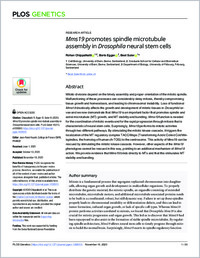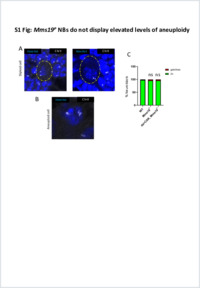Mms19 promotes spindle microtubule assembly in Drosophila neural stem cells
- Chippalkatti, Rohan Cell Biology, University of Bern, Berne, Switzerland - Graduate School for Cellular and Biomedical Sciences, University of Bern, Berne, Switzerland
- Egger, Boris Department of Biology, University of Fribourg, Fribourg, Switzerland
- Suter, Beat Cell Biology, University of Bern, Berne, Switzerland
- 19.11.2020
Published in:
- PLOS Genetics. - 2020, vol. 16, no. 11, p. e1008913
English
Mitotic divisions depend on the timely assembly and proper orientation of the mitotic spindle. Malfunctioning of these processes can considerably delay mitosis, thereby compromising tissue growth and homeostasis, and leading to chromosomal instability. Loss of functional Mms19 drastically affects the growth and development of mitotic tissues in Drosophila larvae and we now demonstrate that Mms19 is an important factor that promotes spindle and astral microtubule (MT) growth, and MT stability and bundling. Mms19 function is needed for the coordination of mitotic events and for the rapid progression through mitosis that is characteristic of neural stem cells. Surprisingly, Mms19 performs its mitotic activities through two different pathways. By stimulating the mitotic kinase cascade, it triggers the localization of the MT regulatory complex TACC/Msps (Transforming Acidic Coiled Coil/Minispindles, the homolog of human ch-TOG) to the centrosome. This activity of Mms19 can be rescued by stimulating the mitotic kinase cascade. However, other aspects of the Mms19 phenotypes cannot be rescued in this way, pointing to an additional mechanism of Mms19 action. We provide evidence that Mms19 binds directly to MTs and that this stimulates MT stability and bundling.
- Faculty
- Faculté des sciences et de médecine
- Department
- Département de Biologie
- Language
-
- English
- Classification
- Biological sciences
- License
-
License undefined
- Identifiers
-
- RERO DOC 329854
- DOI 10.1371/journal.pgen.1008913
- Persistent URL
- https://folia.unifr.ch/unifr/documents/308944
Other files
Statistics
Document views: 118
File downloads:
- pdf: 209
- Supplementary material: 132

